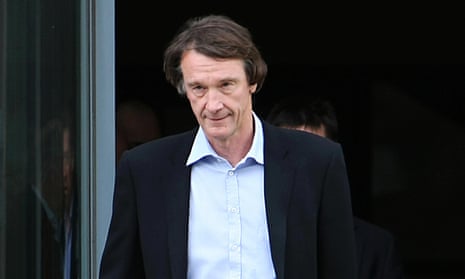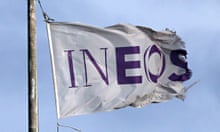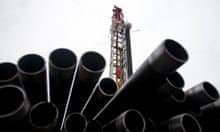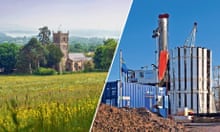One of Britain’s biggest industrial firms has been accused of taking a “bribes and bulldozers” approach to fracking after unveiling a multi-billion pound plan to compensate landowners and local communities affected by its plans to use the controversial drilling technique.
Jim Ratcliffe, the 61-year-old industrialist who founded the chemical giant Ineos, is promising to hand more than 6% of future shale gas revenues to those sitting on the reserves or affected by their extraction, in an effort to replicate efforts in the US where shale gas has created scores of new millionaires. The situation in America contrasts starkly with that of the UK, where efforts to develop the controversial new energy source have been delayed by landowners, environmental groups and the planning system.
Simon Clydesdale, UK energy campaigner at Greenpeace, said: “This is just more of the same bribes and bulldozers approach that has already proved a failure. With one hand the fracking industry goads the government into steamrolling people’s right to oppose fracking under their homes, with the other it offers cash incentives.
“The industry forgets people have legitimate concerns about fracking that won’t be easily assuaged by cash sweeteners. The simple fact that the shale lobby can’t win the argument on safety but has to buy up consensus instead will help convince people that nothing good will come from letting the frackers through the door”.
At the weekend Ineos unveiled a plan to pay 4% of future revenues to landowners and a further 2% to local communities. The offer to locals trumps the 1% that the industry has already committed to. The company estimates the total figure handed to owners and local communities could be worth £2.5bn.
Tom Crotty, a director at Ineos, said: “We are damned if we do and damned if we don’t. We are either greedy capitalists or we offer bribes. More seriously we are trying to replicate how things have been done in the US.”
There is no suggestion that profit sharing in the UK would be illegal. The sharing of shale gas profits is commonplace in America and Ineos argues its move will encourage communities to support shale gas production in their neighbourhoods. Ratcliffe added: “We think this is a game changer for Britain. Giving 6% of the revenues to those living above our shale gas operations will give them a real stake in the success of the venture and encourage the development of the whole shale gas industry”.
Last month Ineos, which was at the centre of last year’s bitter dispute with unions at its Grangemouth petrochemical plant, bought the rights to explore fracking for shale gas in a 127 square mile area around Grangemouth and the Firth of Forth, by acquiring 51% of the rights to fracking licence PEDL 133 which covers the Midland Valley of Scotland. However, the substantially increased financial offer to local communities took the rest of the industry by surprise.
Ken Cronin, chief executive of the trade body UK Onshore Oil & Gas, said: “Ineos has a very important role to play in the development of natural gas from shale in the UK. UKOOG, on behalf of the onshore oil and gas industry, looks forward to discussing Ineos’ proposal in detail. However, to be clear, Ineos’ proposal relates to the production phase of natural gas from shale, which is still some years off, and the focus in the next few years will be drilling exploration wells and determining how much of the gas underneath licence areas is economically recoverable.”
Ineos’ Crotty added the company was “not trying to pull a fast one” by revealing the 6% offer without informing other shale gas groups. When asked if the move might help the company in the latest bidding round for licences being run by the Department of Energy & Climate Change, he said: “I would hope so”.
Fracking for shale gas is a process that involves drilling down into the earth before a high-pressure water mixture is directed at the rock to release the gas inside. Detractors say fracking uses huge amounts of water that must be transported to the site, at significant environmental cost, while they also argue the process potentially allows carcinogenic chemicals to escape and contaminate groundwater near the site.
Supporters insist that the environmental concerns relate to bad practice – rather than an inherently risky process – and argue the energy source could potentially create thousands of jobs and make the UK energy independent.








Comments (…)
Sign in or create your Guardian account to join the discussion